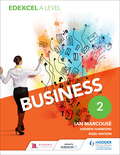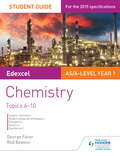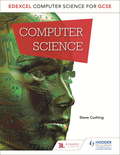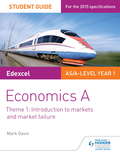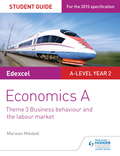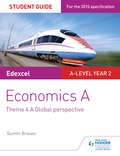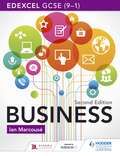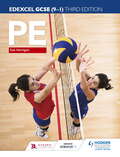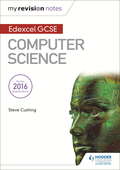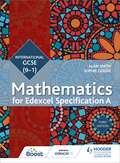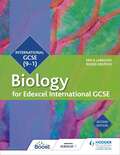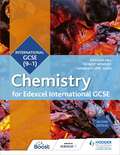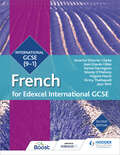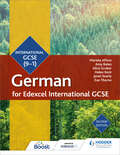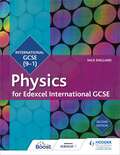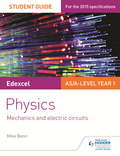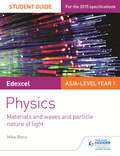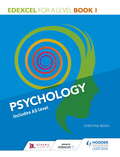- Table View
- List View
Edexcel Business A Level Year 2
by Ian MarcouseTopics are broken down to short, clear chapters, that are all structured in the same way, so students can build their understanding with ease.- Covers each syllabus area in the detail you need, with exercises that have enough depth and variety to give full class and homework coverage- Brings the business world into the classroom with real examples used extensively throughout the text, in extra cases and in end-of-chapter exercises- Features to help reinforce student understanding - in every chapter there's Real Business, an Evaluation and Logic Chain, but also the brand new '5 Whys and a How' which will help students tackle exam questions
Edexcel Chemistry Student Guide 2: Core organic and physical chemistry
by George Facer Rod BeavonReinforce students' understanding throughout their course; clear topic summaries with sample questions and answers to help improve exam technique.Written by experienced examiners George Facer and Rod Beavon, this Student Guide for Chemistry:- Helps students identify what they need to know with a concise summary of the topic or paper examined in the AS/A level specifications- Consolidates understanding with exam tips and knowledge check questions- Provides opportunities to improve exam technique with sample graded answers to exam-style questions- Develops independent learning and research skills- Provides the content for generating individual revision notes
Edexcel Computer Science for GCSE Student Book
by Steve CushingBuild student confidence and ensure successful progress through GCSE Computer Science. Our expert author provides insight and guidance to meet the demands of the new Edexcel specification, with challenging tasks and activities to test the computational skills and knowledge required completing the exams and the non-examined assessment.- Builds students' knowledge and confidence through detailed topic coverage and explanation of key points to match important Edexcel concepts- Develops computational thinking skills with practice exercises and problem-solving tasks- Ensures progression through GCSE with regular assessment questions, that can be developed with supporting Dynamic Learning digital resources- Instils a deeper understanding and awareness of computer science, and its applications and implications in the wider world
Edexcel Economics A Student Guide: Theme 1 Introduction to markets and market failure
by Mark GavinReinforce your understanding throughout the course. Clear topic summaries with sample questions and answers will help you improve your exam technique to achieve higher grades.Written by experienced examiner Mark Gavin, this Student Guide for Economics:- Identifies the key content you need to know with a concise summary of topics examined in the AS and A-level specifications- Enables you to measure your understanding with exam tips and knowledge check questions, with answers at the end of the guide- Helps you to improve your exam technique with sample answers to exam-style questions- Develops your independent learning skills with content you can use for further study and research
Edexcel Economics A Student Guide: Theme 3 Business behaviour and the labour market
by Rachel Cole Marwan MikdadiWritten by experienced examiner Marwan Mikdadi, this Student Guide for Economics:-Identifies the key content you need to know with a concise summary of topics examined in the A-level specifications-Enables you to measure your understanding with exam tips and knowledge check questions, with answers at the end of the guide-Helps you to improve your exam technique with sample answers to exam-style questions-Develops your independent learning skills with content you can use for further study and research
Edexcel Economics A Student Guide: Theme 4 A global perspective
by Quintin BrewerWritten by experienced examiner Quintin Brewer, this Student Guide for Economics:-Identifies the key content you need to know with a concise summary of topics examined in the A-level specifications-Enables you to measure your understanding with exam tips and knowledge check questions, with answers at the end of the guide-Helps you to improve your exam technique with sample answers to exam-style questions-Develops your independent learning skills with content you can use for further study and research
Edexcel GCSE (9-1) Business, Second Edition
by Ian MarcouseExam Board: Edexcel Level: GCSESubject: Business First Teaching: September 2017 First Exam: June 2019 Endorsed for Edexcel. Let Ian Marcouse successfully steer you through the new specification with his proven and popular approach to Business; clear content coverage is enhanced by numerous real-life examples to create a course that engages, motivates and develops every student. Breaks down the content of the 2017 specification into clear, accessible explanations of important concepts and theories. Helps students apply their knowledge to a range of real business examples, issues and contexts, supported by 'Talking Points' that encourage critical and commercial thinking. Improves quantitative, investigative, analytical and evaluation skills through end-of-chapter exercises. Builds students' confidence approaching their exams as they practise calculation, short answer and extended-writing questions with stimulus materials. Boosts students' vocabulary and supports revision with definitions of key terminology for each topic.
Edexcel GCSE (9-1) Business, Second Edition
by Ian MarcouseExam Board: EdexcelLevel: GCSESubject: BusinessFirst Teaching: September 2017First Exam: June 2019Endorsed for EdexcelLet Ian Marcouse successfully steer you through the new specification with his proven and popular approach to Business; clear content coverage is enhanced by numerous real-life examples to create a course that engages, motivates and develops every student.- Breaks down the content of the 2017 specification into clear, accessible explanations of important concepts and theories- Helps students apply their knowledge to a range of real business examples, issues and contexts, supported by 'Talking Points' that encourage critical and commercial thinking- Improves quantitative, investigative, analytical and evaluation skills through end-of-chapter exercises- Builds students' confidence approaching their exams as they practise calculation, short answer and extended-writing questions with stimulus materials- Boosts students' vocabulary and supports revision with definitions of key terminology for each topic
Edexcel GCSE (9-1) PE Third Edition
by Sue HartiganEnsure your students are fully supported throughout their course with Edexcel PE for GCSE Third Edition.This reliable and accessible textbook is structured to match the specification exactly and will provide your students with the knowledge they need, while giving them the opportunity to build skills through appropriate activities.- Key questions to direct thinking and help students focus on the key points- Learning goals to keep you on track with the requirements of the specification- Summaries to aid revision and help all students access the main points - Definition of key words to aid and consolidate understanding of technical vocabulary and concepts- Activities to build conceptual understanding and sound knowledge and understanding, analysis, evaluation and application skills- New practical section to help you plan for the NEA
Edexcel GCSE (9-1) PE Third Edition
by Sue HartiganExam Board: EdexcelLevel: GCSESubject: MathematicsFirst Teaching: September 2016First Exam: June 2018Ensure your students are fully supported throughout their course with Edexcel PE for GCSE Third Edition.This reliable and accessible textbook is structured to match the specification exactly and will provide your students with the knowledge they need, while giving them the opportunity to build skills through appropriate activities.- Key questions to direct thinking and help students focus on the key points- Learning goals to keep you on track with the requirements of the specification- Summaries to aid revision and help all students access the main points - Definition of key words to aid and consolidate understanding of technical vocabulary and concepts- Activities to build conceptual understanding and sound knowledge and understanding, analysis, evaluation and application skills- New practical section to help you plan for the NEA
Edexcel GCSE Computer Science My Revision Notes 2e
by Steve CushingManage your own revision with step-by-step support from experienced teacher and examiner Steve Cushing. Use specific case studies to improve your knowledge of business processes and topics. Apply terms accurately with the help of definitions and key words.-Plan and pace your revision with the revision planner-Use the expert tips to clarify key points-Avoid making typical mistakes with key expert advice-Test yourself with end-of-topic questions and answers and tick off each topic as you complete it-Get exam ready with last minute quick quizzes at www.hoddereducation.co.uk/myrevisionnotes
Edexcel International GCSE (9-1) Mathematics Student Book Third Edition
by Alan King Alan Smith Sophie GoldieEndorsed for EdexcelNurture and strengthen your students' mathematical skills; these expert-written textbooks consolidate knowledge with worked examples, test key skills through practice and extend learning using enrichment activities designed to excite and challenge students.- Support and develop a deeper understanding of topics with plenty of worked examples and practice questions that follow the types of problems students are likely to face- Introduce students to content with fun activities and clear learning objectives at the start of each chapter- Build problem-solving skills with questions that test students' knowledge and comprehension- Further understanding and ignite an enthusiasm for maths with 'internet challenges' that extend learning beyond the curriculum and help to engage students- Offer a complete package of support with free downloadable resources that include detailed worked examples and answers, plus informative 'Personal Tutor' videos for each chapter
Edexcel International GCSE Biology Student Book Second Edition
by Erica Larkcom Roger DelpechProvide your students with complete coverage of the new Edexcel International GCSE Biology specification, with these affordable student books written by expert authors and teachers; testing knowledge and building practical skills throughout.- Build students' confidence with in-depth yet accessible scientific content- Test knowledge and understanding with study questions throughout the book- Improve students' grades with exam-style questions for every section- Challenge higher ability students with extension activities- Build practical skills with coverage of all required practicals plus further suggested experiments- Enable the student to check their own progress with answers to all activities freely available online- Enhance and maximise learning with supporting workbooks for each subject
Edexcel International GCSE Biology Student Book Second Edition
by Erica Larkcom Roger DelpechExam Board: EdexcelLevel: IGCSESubject: BiologyFirst Teaching: September 2017First Exam: Summer 2019Develop your students' scientific thinking and practical skills with this second edition, fully updated to match the new 2017 specifications.- Build students' knowledge with in-depth yet accessible scientific content- Test understanding with study questions throughout the book- Prepare students for the exam with sample answers and expert comments plus exam-style questions for every section- Build practical skills with coverage of all required practicals plus further suggested experiments- Develop mathematical skills with maths explanations and questions throughout- Answers to all activities freely available online
Edexcel International GCSE Chemistry Student Book Second Edition
by Graham Hill Robert WensleyExam Board: EdexcelLevel: IGCSESubject: ScienceFirst Teaching: September 2017First Exam: June 2019Develop your students' scientific thinking and practical skills with this second edition, fully updated to match the new 2017 specifications. - Build students' confidence with in-depth yet accessible scientific content- Test understanding with study questions throughout the book- Prepare students for the exam with sample answers and expert comments plus exam-style questions for every section- Build practical skills with coverage of all required practicals plus further suggested experiments- Develop mathematical skills with maths explanations and questions throughout- Challenge higher ability students with extend and challenge activities- Answers to all activities freely available online
Edexcel International GCSE Chemistry Student Book Second Edition
by Graham Hill Robert WensleyExam Board: EdexcelLevel: IGCSESubject: ScienceFirst Teaching: September 2017First Exam: June 2019Develop your students' scientific thinking and practical skills with this second edition, fully updated to match the new 2017 specifications. - Build students' confidence with in-depth yet accessible scientific content- Test understanding with study questions throughout the book- Prepare students for the exam with sample answers and expert comments plus exam-style questions for every section- Build practical skills with coverage of all required practicals plus further suggested experiments- Develop mathematical skills with maths explanations and questions throughout- Challenge higher ability students with extend and challenge activities- Answers to all activities freely available online
Edexcel International GCSE French Student Book Second Edition
by Amy Bates Jean-Claude Gilles Karine Harrington Helen Kent Janet Searle Jayn Witt Kirsty Thathapudi Wendy O'Mahony Séverine Chevrier-Clarke Mariela Affum Virginia March Alice Gruber Zoe ThorneThis Student Book provides a grammar-led approach with extensive exam preparation to develop independent, culturally aware students of German, ready for the exam.This book is endorsed by Cambridge International Examinations for the latest IGCSE® (0525) and International Level 1/Level 2 Certificate (0677) syllabuses. Extensive use of German reflects the style of the exams and, with specific advice and practice, it helps students use the acquired skills to their best ability. Topics on German-speaking cultures are integrated throughout to ensure students gain the cultural awareness that is at the heart of this qualification.- Develop students' ability to use German effectively - Stretch and challenge students to achieve their best grades - Ensure the progression required for further study at A-level or equivalent - Provide insight and encourage a positive attitude towards other culturesThe book provides up-to-date content following a clear sequencing of topics designed specifically for teaching German at this level. It is designed to develop spontaneous, confident linguists who are able to progress to further study of German.- Teacher Resource + Audio-CDs (ISBN 9781471833076) includes all recordings and transcripts together with detailed guidance, editable vocabulary lists, cultural PowerPoints and interactive quizzes- Grammar Workbook (ISBN 9781471833182)Vocabulary is also available online at Vocab Express, an interactive learning applicationVisit www.vocabexpress.co.uk/hodder for more information.
Edexcel International GCSE French Student Book Second Edition
by Jean-Claude Gilles Karine Harrington Séverine Chevrier-ClarkeThis Student Book provides a grammar-led approach with extensive exam preparation to develop independent, culturally aware students of German, ready for the exam.This book is endorsed by Cambridge International Examinations for the latest IGCSE® (0525) and International Level 1/Level 2 Certificate (0677) syllabuses. Extensive use of German reflects the style of the exams and, with specific advice and practice, it helps students use the acquired skills to their best ability. Topics on German-speaking cultures are integrated throughout to ensure students gain the cultural awareness that is at the heart of this qualification.- Develop students' ability to use German effectively - Stretch and challenge students to achieve their best grades - Ensure the progression required for further study at A-level or equivalent - Provide insight and encourage a positive attitude towards other culturesThe book provides up-to-date content following a clear sequencing of topics designed specifically for teaching German at this level. It is designed to develop spontaneous, confident linguists who are able to progress to further study of German.- Teacher Resource + Audio-CDs (ISBN 9781471833076) includes all recordings and transcripts together with detailed guidance, editable vocabulary lists, cultural PowerPoints and interactive quizzes- Grammar Workbook (ISBN 9781471833182)Vocabulary is also available online at Vocab Express, an interactive learning applicationVisit www.vocabexpress.co.uk/hodder for more information.
Edexcel International GCSE German Student Book Second Edition
by Amy Bates Mariela Affum Alice GruberThis Student Book provides a grammar-led approach with extensive exam preparation to develop independent, culturally aware students of German, ready for the exam.This book is endorsed by Cambridge International Examinations for the latest IGCSE® (0525) and International Level 1/Level 2 Certificate (0677) syllabuses. Extensive use of German reflects the style of the exams and, with specific advice and practice, it helps students use the acquired skills to their best ability. Topics on German-speaking cultures are integrated throughout to ensure students gain the cultural awareness that is at the heart of this qualification.- Develop students' ability to use German effectively - Stretch and challenge students to achieve their best grades - Ensure the progression required for further study at A-level or equivalent - Provide insight and encourage a positive attitude towards other culturesThe book provides up-to-date content following a clear sequencing of topics designed specifically for teaching German at this level. It is designed to develop spontaneous, confident linguists who are able to progress to further study of German.- Teacher Resource + Audio-CDs (ISBN 9781471833076) includes all recordings and transcripts together with detailed guidance, editable vocabulary lists, cultural PowerPoints and interactive quizzes- Grammar Workbook (ISBN 9781471833182)Vocabulary is also available online at Vocab Express, an interactive learning applicationVisit www.vocabexpress.co.uk/hodder for more information.
Edexcel International GCSE German Student Book Second Edition
by Amy Bates Jean-Claude Gilles Helen Kent Janet Searle Mariela Affum Alice Gruber Zoe ThorneThis Student Book provides a grammar-led approach with extensive exam preparation to develop independent, culturally aware students of German, ready for the exam.This book is endorsed by Cambridge International Examinations for the latest IGCSE® (0525) and International Level 1/Level 2 Certificate (0677) syllabuses. Extensive use of German reflects the style of the exams and, with specific advice and practice, it helps students use the acquired skills to their best ability. Topics on German-speaking cultures are integrated throughout to ensure students gain the cultural awareness that is at the heart of this qualification.- Develop students' ability to use German effectively - Stretch and challenge students to achieve their best grades - Ensure the progression required for further study at A-level or equivalent - Provide insight and encourage a positive attitude towards other culturesThe book provides up-to-date content following a clear sequencing of topics designed specifically for teaching German at this level. It is designed to develop spontaneous, confident linguists who are able to progress to further study of German.- Teacher Resource + Audio-CDs (ISBN 9781471833076) includes all recordings and transcripts together with detailed guidance, editable vocabulary lists, cultural PowerPoints and interactive quizzes- Grammar Workbook (ISBN 9781471833182)Vocabulary is also available online at Vocab Express, an interactive learning applicationVisit www.vocabexpress.co.uk/hodder for more information.
Edexcel International GCSE Physics Student Book Second Edition
by Nick EnglandExam Board: EdexcelLevel: IGCSESubject: ScienceFirst Teaching: September 2017First Exam: June 2019Build students' knowledge with in-depth yet accessible scientific content.- Test understanding with study questions throughout the book- Prepare students for the exam with sample answers and expert comments plus exam-style questions for every section- Build practical skills with coverage of all required practicals plus further suggested experiments- Develop mathematical skills with helpful tips throughout - Challenge higher ability students with extension 'extend and challenge' activities - Answers to all activities freely available online
Edexcel International GCSE Physics Student Book Second Edition
by Nick EnglandExam Board: EdexcelLevel: IGCSESubject: ScienceFirst Teaching: September 2017First Exam: June 2019Build students' knowledge with in-depth yet accessible scientific content.- Test understanding with study questions throughout the book- Prepare students for the exam with sample answers and expert comments plus exam-style questions for every section- Build practical skills with coverage of all required practicals plus further suggested experiments- Develop mathematical skills with helpful tips throughout - Challenge higher ability students with extension 'extend and challenge' activities - Answers to all activities freely available online
Edexcel Physics Student Guide 1: Topics 2 and 3
by Mike BennWritten by experienced teacher and author Mike Benn, this student guide for Physics:· Helps you identify what you need to know with a concise summary of the content examined in the AS and A-level specifications· Consolidates understanding with exam tips and knowledge check questions· Provides opportunities to improve exam technique with sample answers to exam-style questions· Develops independent learning and research skills · Provides the content for generating individual revision notes
Edexcel Physics Student Guide 2: Topics 4 and 5
by Mike BennWritten by experienced author and teacher, Mike Benn, this student guide for Physics:· Helps you identify what you need to know with a concise summary of the topics examined in the AS and A-level specifications· Consolidates understanding with exam tips and knowledge check questions· Provides opportunities to improve exam technique with sample answers to exam-style questions· Develops independent learning and research skills · Provides the content for generating individual revision notes
Edexcel Psychology for A Level Book 1
by Christine BrainExam Board: EdexcelLevel: AS/A-levelSubject: PsychologyFirst Teaching: September 2015First Exam: June 2016Endorsed for EdexcelDevelop your students' knowledge of the foundations of modern psychological understanding with this detailed textbook for Edexcel AS and A level Psychology, with targeted activities and clear explanations to build practical, mathematical and problem-solving skillsWritten by experienced author and examiner Christine Brain, this AS and year one A level textbook is fully mapped to the new Edexcel specification.- Helps students build their confidence in practical, mathematical and problem-solving skills through well-presented explanations and activities- Develops understanding and helps each student reach their potential with the essential information covered in a clear, logical format, supported by illustrations, questions and extension tasks- Supports you and your students through the new specification, with accessible coverage of all the key areas of Psychology for AS and year one of A level- Encourages your students to develop their interest in Psychology and its applications, with extension tasks and relevant content
